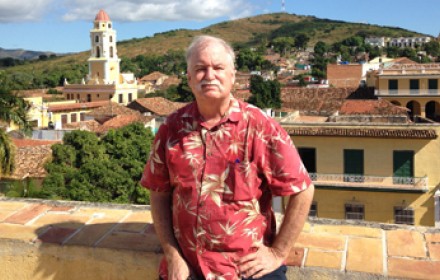Converse y Havana: Music Business Professor Breaks Barriers In Cuba

Here at the Petrie School of Music, you can’t move without hearing music from somewhere—a practice room, a classroom, Daniel Recital Hall, even from the furniture in the Blackman lobbies where students break out in an impromptu aria or a bit of a cappella. The same is true in Cuba, where John Jeter, an adjunct professor in Converse’s new Music Business & Technology Certificate program, flew in one of the first-ever caravans of private airplanes to land in Havana.
“I believe Cuba is one of the world’s most influential sources of music.”
During his weeklong trip in January, he saw and heard music everywhere, almost around the clock. People sang, danced, listened to radios and smart phones with and without ear buds—you see more cell phones in Cuba than you might imagine. Jeter heard bands, chorales, schoolchildren, street musicians, even phonograph players as old as the classic American cars still thrumming on Havana’s streets.
He spent hours, day and night, walking through Old Havana in the dilapidated Cuban capital and found once-glorious old buildings with windows that have no glass or screens. Looking through the barred windows, he often saw and heard people singing and dancing, alone and together.
Today, a new tune plays between the United States and Cuba after nearly 60 years of frozen relations. An American flag now flies in front of the US Embassy that has opened since Washington normalized relations with the Castro regime last July. Yet despite the US embargo, the flow of Cuban music has never stopped.
“From the explosion of the Buena Vista Social Club to the ongoing export of such sounds as Afro-Cuban jazz, charanga, mambo, timba, rumba and so many other styles, I believe Cuba is one of the world’s most influential sources of music,” Jeter says.
As a former owner of The Handlebar, a longtime concert venue in Greenville, S.C., he remembers booking Los Tres de la Havana, an eight-piece band whose core comprised three Cuban exiles. On a hot August night in 2009, long before President Obama and Cuban President Raul Castro shook hands to work toward closer ties, the group showcased a relatively new genre known as Cubaton, a distinctly Cuban version of Reggaetón, a Puerto Rican-born mash-up of salsa, hip hop, electronica and Jamaican dancehall. In 2011, the Cuban government denounced Cubatón as “degenerate” and directed radio to reduce its play.
Still, an article in a Spanish-language newspaper about the Greenville show told how the omnipresence of music in the Caribbean’s largest island led to the group’s creation. “In Cuba, we were friends in the neighborhood,” the article said. “We always liked to sing.”
Only 47 people showed up that night in Greenville to take the aural trip to Havana.
“People didn’t come to that show primarily because of our inability to educate the market about how great world music is,” Jeter says. “If we had been able to convince folks that Cuban music is incredible entertainment, they would have learned a lot while they were dancing the entire time.”
That kind of music promotion, marketing and branding is part of Jeter’s spring Music Concert Promotion & Venue Management course, which studies concert-venue management and concert production. In addition, another course offers a Practicum for students to produce a rock show like November’s concert with STRIKING MATCHES at Daniel Recital Hall.
“I’m hoping a lot of students sign up for one or both courses, and not just music students, but anyone interested in a world of personal and business opportunities, ” Jeter says. “We might even figure out how to get a Cuban band to come here or how to take one of our own ensembles to Havana. How cool would that be?”